
Library
Database search tips
If your question is not answered here, contact the Library, or Ask a Librarian.
Some paths and images may appear differently to Mac users.
Ovid databases
Limit your search results in Ovid
Basic limits like English and publication year are available under the search box in Ovid databases. Use Additional limits to display more limits to refine your search.
You'll see a whole range of limits to apply to your search. The most commonly used are Age Groups and Publication Types.

Use filters to limit search results
A filter is a separate search strategy that can be applied to your own search to limit results.
A range of filters have been saved in the Ovid platform for your convenience (see Ovid search filters tip). Log into your Ovid personal account to access the filters.
Filters are database specific, so use a Medline filter in Medline only, Embase filter in Embase only, etc.
Contact the Library to get help in learning to apply filters to your search.
Ovid search filters
Search filters will limit your results to a specific population group, study type or setting.
These search filters are available for Ovid databases:
- Diagnosis
- Etiology
- Prognosis
- Therapy
- Meta-analysis
- Cochrane (RCT)
- Age filter for 0-24 years old
- Developing countries
- Systematic reviews
- Epidemiologic
- Animals-only
Access the search filters by logging into your Ovid Personal Account, then go to My Workspace/My Searches & Alerts/Expert Searches*.
Filters are database specific, so be sure to select the right filter for the database you are using.
* Available to RCH campus users only
Using the ADJn proximity operator in Ovid
Use the ADJn proximity operator when you are unsure of the exact phraseology used in the literature.
For example, (survival ADJ2 rate).mp. will find terms in any order and with one word (or none) between them. The search will retrieve: survival rate; rate of survival; survival (PFS) rate; survival (OS) rate, etc. The higher the value of n, the greater the retrieval.
ADJ can be applied without a number, e.g. (survival ADJ rate).mp. In this instance, it is identical to “survival rate”.mp. Without the n, the search is directional; the word survival must come before the word rate.
This applies to keyword searching only.
Map to the MeSH thesaurus in Ovid Medline
Here's how to find the relevant thesaurus (MeSH) terms for your search:
We'll use an example search of aortic valve disease.
- Enter the terms aortic valve disease into the search field
- Check Map Term to Subject Heading
- Hit Search
- Now with the MeSH terms showing, select Aortic Valve Disease to display the tree
- Scroll down to find Aortic Valve Disease and check Explode to include narrower terms
- Important: check the scope note to see if this term is valid for the required years
Since Aortic Valve Disease is a recently entered term, you must include previous indexing terms: Aortic Valve, Heart Valve Disease in your search or you will not find anything on this topic before 2021.
Refer to Fact sheet no. 2 on searching, saving and managing search results on Ovid, or contact the Library for more help.
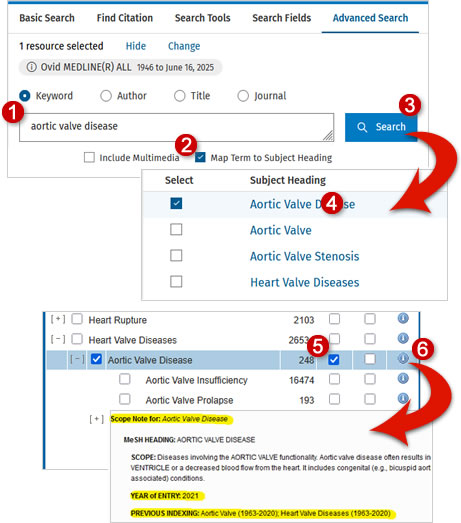
Check the year of entry for MeSH terms
MeSH (Medical Subject Heading) terms are updated annually so it is important that you check the year of entry for each term to see if it is current and valid at the start year of your search.
Details of the MeSH term including Year of entry is found in the Scope (denoted by the 'i'). For example, in the Scope for Autism Spectrum Disorder, the Year of entry is 2016 and Previous indexing terms are Child Development Disorders, Pervasive (2010-2015).
Therefore, using the MeSH term Autism Spectrum Disorder will only retrieve items from 2016 onwards. To find literature before 2016 you must add the MeSH term Child Development Disorders, Pervasive to your search.
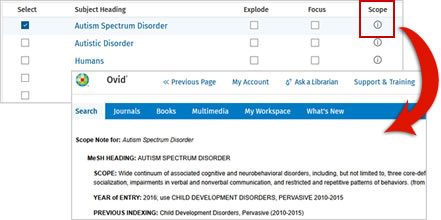
Use Contexts in Ovid Medline to check for narrower terms
When a MeSH term appears to have no narrower term(s), use Contexts to see if there are narrower terms under a different branch.
For example, the MeSH tree for Oral Hygiene falls under the Hygiene branch and has no visible narrower term(s).
- After searching for Oral Hygiene select it from the Subject Headings result page.
- You can scroll down the tree to see your selected term highlighted. Select Contexts from the top of the tree to view other branches that may contain Oral Hygiene.
- You’ll now see that Oral Hygiene also falls under the branch Preventive Dentistry and contains two narrower terms: Dental Devices, Home Care and Toothbrushing. If both the narrower terms are relevant to your search select Oral Hygiene and Explode.
- Select Continue to include both branches in your search.
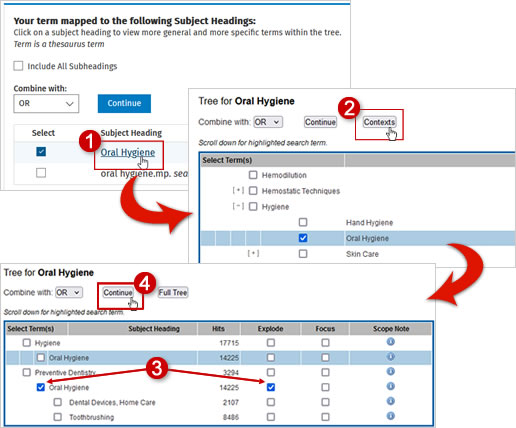
An alternative to using the Age Groups tag
Most databases have a limit for Age Groups, such as All Child (0-18), available from the Additional Limits option. In most situations this is sufficient in reducing the search results to that particular age group.
In a systematic review it may not be sensitive enough to capture all relevant articles for this age group. Instead, consider limiting your search to keywords that describe your age group, e.g. in Ovid databases, use:
(newborn* OR neonat* OR infan* OR pre-schooler* OR preschooler* OR child* OR adolescen* OR pediatric*1 OR paediatric*1 OR youth*1 or teen or teens or teenage* or teen-age*).af.
Note: .af. searches all fields in the database.
An expanded version of this is available as a filter which you can apply to a new or existing search. See the tip Ovid search filters.
Field searching in Ovid
Limiting your keyword search to certain fields is an effective method for reducing search results. First, find the field code (abbreviation) supported by the database. In Ovid, you'll find this in the Search Fields tab (located above the search box).
Examples of field searching
These example searches will find the phrase “transitioning econom*” in the Title & Abstract, Keyword Heading, Candidate Term and Subject Heading fields respectively:
- Medline (Ovid): (transitioning adj econom*).tw,kf,hw.
- Embase (Ovid): (transitioning adj econom*).tw,kw, dq,hw.
- APA PsycInfo (Ovid): (transitioning adj econom*).ti,ab,id,hw.
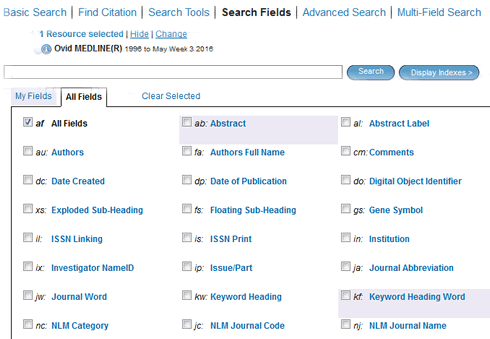
Go to My Searches & Alerts to view your saved Ovid search
After logging into your personal Ovid database account you may not be able to see your saved search. Don't panic! In your My Workspace area make sure that you are in My Searches & Alerts, not My Projects.
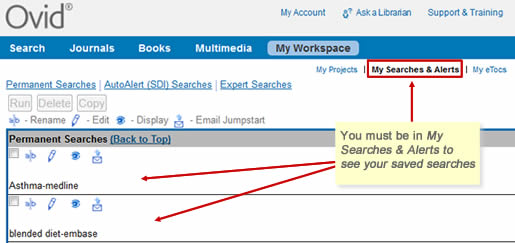
Edit your saved search in Ovid
Display your search in Edit mode:
- Go to My Workspace and log in
- Select My Searches & Alerts
- Select the Edit tool
Now you can Edit or Delete individual lines, and Insert additional lines. Submit changes for each line then Save.
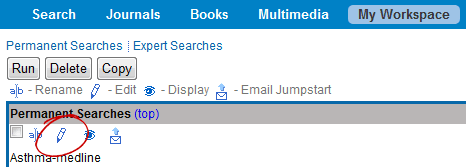
Edit your Ovid search directly in the search history
After doing your search go to Actions/More/Edit to open the Edit Search History feature.
Use the icons to perform the desired actions. You can edit a line; insert a line above; insert a line below; and delete a line.
Once all changes have been made, choose Run Search and the edited search will display in the search history.
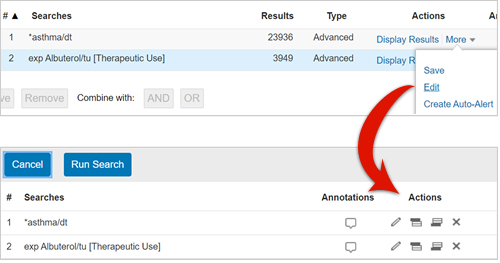
Use subheadings to narrow your search
You can restrict the focus of your search by limiting MeSH terms to specific subheading(s) only.
For example, to find articles on the use of all bronchodilator agents in treating respiratory disorders, limit the MeSH term bronchodilator agents to the subheading tu (therapeutic use).
In Ovid Medline, the search line becomes: exp bronchodilator agents/tu.
Use floating subheadings to broaden your search
Floating subheadings (fs) are subheadings that are not attached to any particular thesaurus term and are used to broaden a search.
For example, to search for the epidemiology of diseases in developing countries, you can apply the subheading ep (epidemiology) to various thesaurus terms that describe diseases such as Malaria/ep; HIV Infections/ep; Diarrhea/ep; etc.
Unless you can include ALL the disease thesaurus terms, a sensible approach is to search for the epidemiology floating subheading: ep.fs. This will retrieve any papers that contain the subheading ep (epidemiology) regardless of the thesaurus term in front of it.
Each thesaurus term has different subheadings. Subheadings are database specific, for example: the subheading 'ab' (abnormalities) in Medline does not exist in Embase.
Explode thesaurus term to increase results
Expand your search by using explode on the thesaurus term to include that term plus narrower terms in your search results.
For example, in Ovid Medline, a search using the MeSH term “asthma” alone (asthma/) retrieves a large result set. Exploding that term (exp asthma/) retrieves many more results.
These results now include the narrower terms: asthma, aspirin-induced; asthma, exercise-induced; asthma, occupational; and status asthmaticus.
You can chose to include some or all the different types of asthma. Don’t explode if the narrower terms are irrelevant.
Explode can be applied to a thesaurus term only, never to a keyword.

Ovid stopwords
Words of little intrinsic meaning that occur too frequently to be useful in searching text are known as stopwords. In Ovid, you cannot search for stopwords by themselves, but they are searchable in a phrase.
For example:
scope of practice.ti. (871 results)
This will return results containing: scope of practice; scope for practice; scope and practice; and scope in practice.
Adding truncation (*) to the stopword will make the search more specific:
scope of* practice.ti. (855 results)
This will only return results with the exact phrase scope of practice.
Examples of stopwords are: about; an; for; from; this; to; what; with.
See the full list of Ovid stopwords.
Ovid reserve words
Reserve words such as: and; or; not; use; adj; add; sub; and scope are processed as operators when entered as part of a query.
When enclosed in quotes, they are treated as a literal terms. For example, scope is an advanced search syntax command that automatically opens the actual scope note (term definition). To use it as a search term and not as a syntax command, enclose it in quotes, for example "scope of nursing practice".
Searching for Greek letters in Ovid
Greek letters are transliterated and indexed as their text equivalents. For example, the Greek letter Α appears in records as <alpha>, with angle brackets enclosed around the word alpha. To search the Greek letter Α, use quotation marks, for example "<alpha>".
Quickly switch to another database
In Ovid databases
When you have searched in an Ovid database such as Medline or Embase, use the Change link to select a different Ovid database and start another search. Select Continue to start a new search in the selected database.
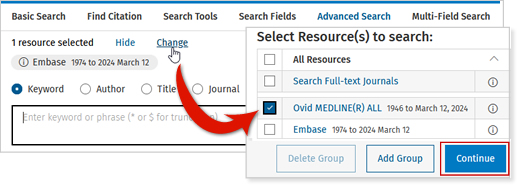
In Ebsco databases
When you have completed your search in Medline, for example, use the Choose Databases link to select a different database, such as CINAHL. Be sure to deselect Medline first, then choose OK.
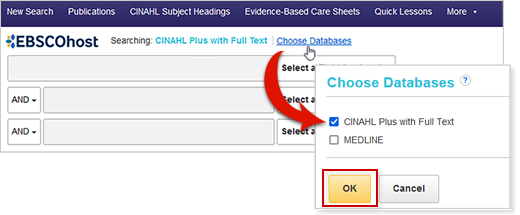
Ovid session time out message
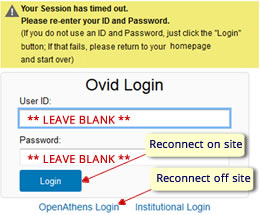
You may be confronted with a "time out" message in Ovid databases
This means you were idle for too long, or you took too long browsing results without interacting with the interface.
To reconnect, don't fill in the login fields, just hit the Login button if you are on site at RCH, or use the OpenAthens Login link if you are off site.
This is a timely reminder to save your search frequently. All work will typically be lost after the last save point.
Split Ovid search results into batches for export into EndNote
The maximum number of records that can be exported into EndNote from any Ovid database search results is 5000.
You can use quick commands in the search box to split a large number of results into batches. In the following commands, x refers to which search line number you wish to export from:
From x keep 1-5000
(displays the first batch of 5000 records)
From x keep 5001-10000
(displays the next batch of 5000 records)
Exclude animal-only studies in Ovid databases
To limit to human studies, do not use the Humans limit. Instead, exclude all animal-only studies from your search.
Use the table below to see a sample search on how this works in each database.
| Sample search: look for studies on drug therapy in cancer | ||
| Ovid Medline | Ovid Embase | Ovid APA PsycInfo |
Search line #1: |
Search line #1: |
Search line #1: |
| Identify all animal-only studeies | ||
Search line #2: |
Search line #2: |
Search line #2: |
|
Search line #3: |
|
|
Search line #4: |
|
| Remove the animal-only studies from your search results | ||
Search line #3: |
Search line #5: |
Search line #3: |
Studies with Animals only have been discarded, leaving Humans only, joint Humans and Animals, and any studies that haven't been assigned as either Humans or Animals.
The search terms to identify Animal only studies have been saved as filters within Ovid. See the tip Ovid search filters for how to apply the filter to your search.
Using the Permuted Index in Ovid
If you are uncertain about the exact wording of a subject heading, use the Permuted Index to find the heading you want
The Permuted Index allows you to search for a single term and see all the thesaurus terms that contain or are associated with that term. Since many indexed terms are part of multi-word phrases (like morbid obesity or anti-obesity agents), your term may display as part of a phrase.
For example, searching for knowledge will display headings containing that term, such as Patient medication knowledge; Health knowledge, attitudes, practice etc.
- Select the boxes of terms that interest you.
- Choose to Explode (expand results to include records about the broader topic and all related topics) or Focus (retrieve only those results that pertain to the subject heading).
- Combine with the Boolean OR if you selected more than one term.
- Select Continue to see the results.
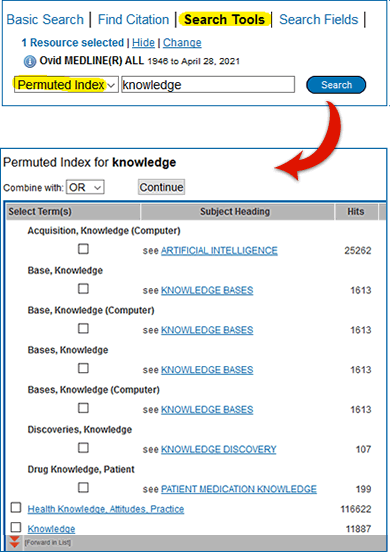
Use PubMed ID (PMID) to search for articles in Ovid databases
You can use the Advanced Search mode in Ovid Medline to find the relevant thesaurus (MeSH) terms for your search
We'll use an example search of aortic valve disease.
- Enter the terms aortic valve disease into the search field
- Check Map Term to Subject Heading
- Hit Search
- Now with the MeSH terms showing, select Aortic Valve Disease to display the tree
- Scroll down to find Aortic Valve Disease and check Explode to include narrower terms
- Important: check the scope note to see if this term is valid for the required years
Since Aortic Valve Disease is a newly entered term, you must include previous indexing terms: Aortic Valve, Heart Valve Disease in your search or you will not find anything on this topic before 2021.
Refer to Fact sheet no. 2 on searching, saving and managing search results on Ovid, or contact the Library for more help.
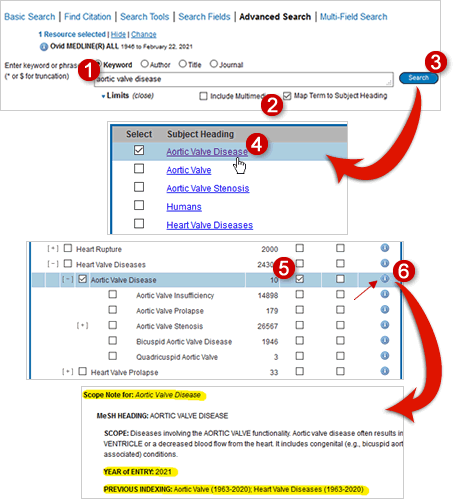
Share your Ovid searches
After performing a search in an Ovid database there are several ways to share your search with colleagues
Email All Search History: allows users to send their current search history to another user via email. The email includes the search strategy with line numbers and number of results, database segment(s), the date the search was executed, a link to run the search, and a message from the sender.
Copy Search History Link: copies a search history link to the user's clipboard. By copying this link directly into a browser, if you are on-site, the search history will load. You can view the search results or better still, save the search history into your own account. If you are off-site you will be prompted to log in. Use the OpenAthens Login link, find your institution and log in with your OpenAthens personal account to load the search. Then save it into your own account.
Copy Search History Details: copies the search strategy, line numbers, number of results per line, and database segment(s) to the user's clipboard.
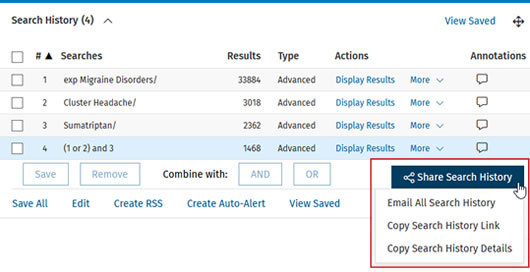
Use a command to run your saved search in Ovid databases
You can use an easy shortcut command to run your saved search right from the Search box in any Ovid database.
You must be logged into your personal account first for this to work:
..e your search name
So, if the name of your saved search is Asthma-medline, your command will be:
..e Asthma-medline
Note the double dots and space before the search name. The search name must be exact and is case sensitive.
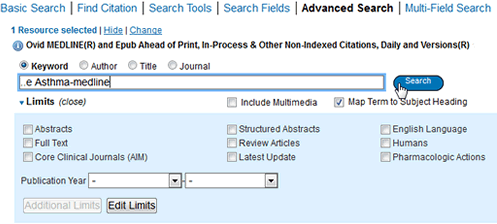
EBSCO databases
Force your search history to display in ascending order
By default, the search history in Ebsco displays in descending order. To reverse the order, choose the Search ID# above your last search line in the search history box:

Merging personal accounts in Ebsco databases
If you have two Ebsco personal accounts, you can merge multiple accounts into one single account. If you have more than two accounts, repeat the process until all accounts are merged into one.
All saved searches, alerts, custom folders etc. will be stored in the one account.
Choose wisely
If the accounts being merged are from different institutions, only content available in the target institution will be merged.
This is because available content will differ between institutions, so only the content that is available from the institution through which the target account was created will be merged.
Limit to peer reviewed journals in EBSCO databases
In Ebsco's CINAHL and ERIC databases you can limit your results to peer reviewed journals. Use the Edit link in your search history and select Peer Reviewed. The peer reviewed option is not available in Medline.
Proximity searching in EBSCO databases
Use W1 to find words next to each other in EBSCO, for example: heart W1 attack will find the phrase "heart attack". W1 implies the search is directional; the word heart comes before the word attack.
Use N with a number, for example N3, to increase the sensitivity of your search. The N is non-directional, so a search for heart N3 attack will find both terms in any direction with up to three words in between, for example this would find the phrases: attack on heart, heart drug could reduce attack.
This tip can only be applied to keyword searching.
Wildcards and truncation in EBSCO databases
Wildcards: represented by a question mark ? or pound sign #
- Use question mark ? to replace a single character, for example: wom?n will find woman or women.
- Use pound sign # where an alternate spelling may contain an extra character, for example, p#ediatric will find pediatric or paediatric.
Truncation: represented by an asterisk *
- Generally used to find word endings but can also be used within words or between words.
- computer* will find computer, computers, computerised or computerized.
- hea*one will find headphone, headstone, heartstone
- midsummer * dream will find midsummer night's dream, midsummer day's dream
Special notes
- Wildcards and truncation can be combined in a search term. For example, searching for p#ediatric* will find pediatric pediatrics pediatrician pediatricians paediatric paediatrics paediatrician paediatricians etc.
- Can only be applied to keyword searching.
- Not allowed as the first character in a search term.
PubMed
Customise your NCBI PubMed account
You can configure your free My NCBI account to show Free Full Text and RCH Full Text in PubMed searches by customising your preference settings. When logged in, your own preferences will override any institutional settings.
See Fact Sheet no.14: PubMed: search, save, and manage results for detailed instructions.
Proximity searching in PubMed
You can search PubMed for multiple terms appearing in any order within a specified distance of one another in the Title [ti] or Title/Abstract [tiab] fields
Proximity search adds another useful tool to your search toolkit. Searching for the same terms using a variety of techniques (e.g., combining terms with AND, searching for an exact phrase) and comparing the results can help you decide which option(s) to use.
Proximity searching can be particularly helpful when searching for concepts that may be represented in multiple ways, or to capture variations of a phrase.
Format: "search terms"[field:~N]
- Search terms = two or more words enclosed in double quotes.
- Field = the search field tag tor the Title or Title/Abstract fields. Use [Title] and [Title/Abstract] or the abbreviated [ti] and [tiab].
- ~N = the maximum number of words appearing between the search terms. The larger the N value the broader the search (retrieves more results).
- If N=0 search terms will appear next to each other in any order with no word in between.
- Use a phrase search instead of a proximity search if you wish to retrieve the exact phrase with terms appearing in a specific order.
- Truncation (*) is disallowed. If truncation is applied the proximity operator is ignored.
- Boolean operators and stopwords included in the quoted terms for proximity are treated like regular keywords.
Example of proximity searching in the Title/Abstract [tiab] fields
“postoperative complications”[tiab: ~3]
Will find:
postoperative complications
postoperative pulmonary complications
complications in the postoperative
Will not find:
complications that appear postoperatively
See also ...
Refining your PubMed results when doing keyword searches
Keyword searching in PubMed can retrieve too many results. Use these tips to make your results more manageable.
- Enclose the search term in quotation marks to search as a phrase (for more than one word). If it is a single word, it will look for that exact word only. Compare #1 and #2 below. Without quotation marks, it retrieved related terms e.g. altruism:
- Use Advanced search and choose Title/Abstract fields. Instead of using the basic search box, which defaults to searching All Fields, change to Advanced and select Title/Abstract:
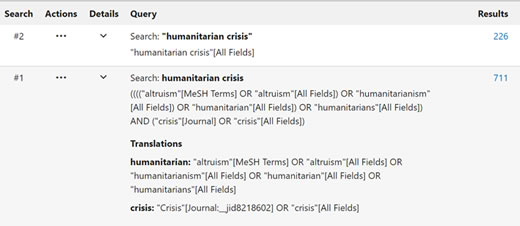
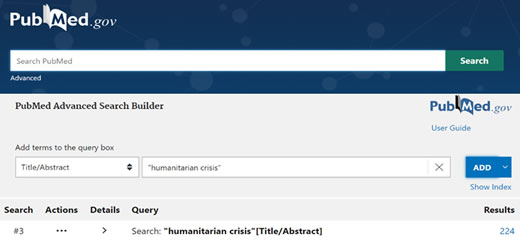
Export PubMed results as different file types
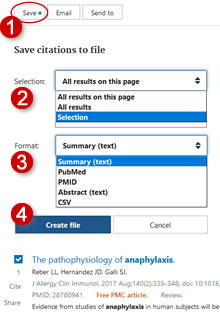
PubMed allows you to export results as different file types. You choice will depend on how you intend to use the file.
Above your results:
- Select Save
- Select All results on this page, All results, or Selection from the 'Selection' drop-down menu
- Choose your Format, either Summary (text), PubMed, PMID, Abstract (text), or CSV
- Then Create file
The PubMed format is required for exporting into Covidence and EndNote. See our Fact Sheet No.12 for an alternate way to export results from PubMed into EndNote. CSV format is required for Excel.
Export PubMed results into EndNote or Zotero
You can export a .nbib file from PubMed to results into EndNote and Zotero.
- Perform your search then choose Send to/Citation Manager
- Select All results on this page, All results, or Selection
- Select Create file
- Save the .nbib file, then open EndNote or Zotero and import.
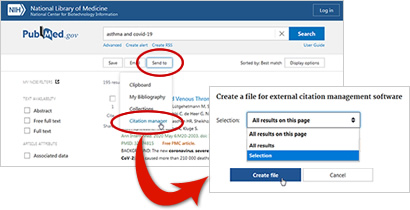
Export PubMed results to Covidence
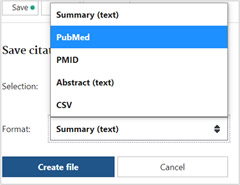
You can export a .nbib file from PubMed to results into EndNote and Zotero.
- Perform your search then choose Send to/Citation Manager
- Select All results on this page, All results, or Selection
- Select Create file
- Save the .nbib file, then open EndNote or Zotero and import
The Cochrane Library
How to manually add search lines to Search Manager in The Cochrane Library
Unlike Ovid/Ebsco databases and PubMed, The Cochrane Library does not automatically keep your search lines in the search history. You must manually add each search line by choosing the Add to Search Manager link.
Go to the Search Manager tab to view all your saved search lines. Log into your account to save the complete search history and name your search.
Advanced search tips for The Cochrane Library
- Use NEXT to search for heart attack or heart attacks, but not attacking the heart. For example: heart NEXT attack*. This operator assumes the terms are in the direction keyed. Don't use numbers with NEXT, such as NEXT/2.
- Use NEAR to search for words appearing in either direction, with a number to denote the maximum number of words between the terms. For example: heart NEAR/2 attack* will find heart attack, heart attacks, attacking the child’s heart, heart that is attacked.
- Truncate search terms using an asterisk*. For example: heart attack* will find papers on heart attack, heart attacks, attacking heart. The root word must be at least 3 characters.
- Enclose terms in quotation marks to search for an exact phrase. For example: "heart attack" will find only that exact phrase. Do not enclose an asterisk in a phrase, for example "heart attack*".
Google and Google Scholar
Using AND, OR in Google or Google Scholar
You don't need to use AND to combine search terms in Google or Google Scholar; it's the default operator and will be ignored.
However, the OR operator is accepted, but it must be in capitals. Alternatively you can use the pipe | to replace the OR.
For example: Dementia methylphenidate|ritalin will give the same results as Dementia methylphenidate OR ritalin.
Both will search for dementia with methylphenidate as well as dementia with ritalin. No spaces required around the pipe character.
Using parentheses in Google or Google Scholar
Don't use parentheses in Google or Google Scholar searching: parentheses are ignored.
A search for Dementia (methylphenidate OR ritalin) will find the same results as Dementia methylphenidate OR ritalin.
Using the asterisk (*) in Google or Google Scholar
You can't use the asterisk* for truncation, for example neonat*, but you can use it to replace a single unknown term in a search query or phrase. You can even use more than one, but when they are applied in a row there must be a space between each one.
For example:
"The * * that you absolutely have to know, is the * of the *"
This search string would find the quote by Albert Einstein: "The only thing that you absolutely have to know, is the location of the library".
Excluding or including search terms in Google or Google Scholar
To exclude a term from your search results, use the minus(-) sign. Do not use NOT.
For example:
dementia methylphenidate OR ritalin -sleep -appetite
This will exclude sleep and appetite.
To include a term in your search, just enter the term. Do not use the plus(+) sign.
For example:
dementia methylphenidate OR ritalin apathy
This will find dementia with either methylphenidate or ritalin, as well as apathy.
Phrase searching in Google and Google Scholar
Enclose your search terms in quotation marks to search for an exact phrase.
For example:
“sleep disorders in children”
You can add an OR, or use | (the pipe character) within the phrase to find variations.
For example:
“sleep disorders|apnea in children”
... will retrieve ...
“sleep disorders in children” OR “sleep apnea in children”
Proximity searching in Google and Google Scholar
Use AROUND(n) where n=number of words between search terms.
For example:
“sleep disorders”|“sleep apnea” AROUND(3) children
... will retrieve ...
“sleep disorders or sleep apnea” ... within 3 words of “children”.
Configure Google Scholar to access RCH Library subscribed content
Make sure you are logged in to your Google account, go to Google Scholar, then:
- Go to your Google Scholar settings and select Library links.
- Search for royal children's hospital.
- Select Royal Children’s Hospital Melbourne Library – Find it @ RCH.
- Save your settings.
Your Google Scholar searches will now show “Find it @ RCH” for articles you can access immediately. Remote access requires an OpenAthens login.
For articles that are not immediately available, select More / Try RCH Document Delivery and we will source the article for you using our Document Delivery service.
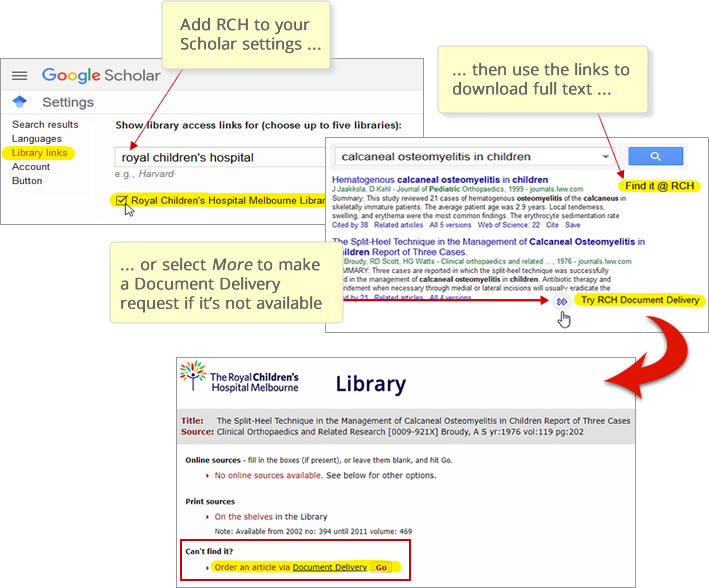
Highlight and comment in Google Scholar PDF reader
Google Scholar PDF Reader, a browser extension from the Chrome store, allows you to mark key passages or make notes as you read.
Select the text you want to emphasize, and a popup will appear, allowing you to choose a highlight colour or add a comment.
Highlights and comments are saved automatically to your personal Google Scholar Library.
The cloud icon confirms your notes are saved online. Access them from any device when logged into your Google account.
You can view all your highlights and comments in the PDF, and also see them in your Scholar library. Other functions include: AI Outline for quick overview; one-click preview of cited articles; linked figure and table mentions; citing and related articles; and light/dark modes.
See more details in this Google Scholar blog post

General tips
Understand the difference between keyword searching and thesaurus searching
Keyword search
A keyword search will only search in certain indexed fields such as the author, title, subject heading and abstract fields. These may differ between databases. If your search term is not contained in one of these fields then some relevant articles will not be included in the search results.
Your search will only retrieve results based exactly on the terms entered. For example, a search for cardiac arrhythmias will not retrieve other forms of the word including synonyms, singular/plural, one word/two words/hyphenated, or British/American spellings. This can produce a lot of irrelevant search results, for example an article may mention these terms but overall it may not be relevant to your topic.
Thesaurus search
A thesaurus search means you are searching for specific database terms that describe the concept of your topic, and will retrieve synonyms as well. This produces precise and relevant results, allowing you to retrieve all items in the database on your topic. Always use thesaurus searching when available.
In PubMed you can access the thesaurus via the MeSH Database link under Explore.
Ovid databases automatically map to the thesaurus (for RCH users).
For Ebsco databases use the tabs at top of the search screen:
- CINAHL: CINAHL Subject Headings
- ERIC: Thesaurus
- Medline: MeSH (year).
Search one concept at a time
Divide your search question into individual concepts, and then search each concept separately.
Search question: Management of cardiac arrhythmias in the Emergency department
- Concept 1: cardiac arrhythmias
- Concept 2: Emergency department
Boolean AND versus Boolean OR
Combine different concepts using AND
For example: cardiac arrhythmias AND emergency department will retrieve articles containing both search terms.
Combine similar concepts using OR
For example: emergency service, hospital OR emergency department* will retrieve articles containing either term.
Explode thesaurus terms to broaden your search
When searching using thesaurus, include narrower terms if relevant.
In Medline/PubMed, the thesaurus (MeSH) term for cardiac arrhythmias is:
arrhythmias, cardiac.
Exploding this term will increase your search results by including:
arrhythmia, sinus; atrial fibrillation; atrial flutter; bradycardia; Brugada Syndrome; cardiac complexes, premature; commotio cordis; heart block; Long QT Syndrome; parasystole; pre-excitation syndromes; tachycardia; ventricular fibrillation; and ventricular flutter.
By not exploding, results are limited to articles containing the thesaurus term arrhythmias, cardiac, not the more specific types of cardiac arrhythmias.
In Ovid and EbscoHost databases you must choose to explode the term. In PubMed the term is exploded by default.
Focus thesaurus terms to narrow your search
You can Focus a thesaurus term in your search to reduce the number of results. When Focus is applied the thesaurus term becomes a major term, that is it becomes the main point in the paper.
For example, focussing the thesaurus term arrhythmias, cardiac will only find articles where cardiac arrhythmias are the main subject.
Applying focus will limit retrieval, so you should use it only at the refining stage of your search, not at the initial stage. It can only be applied to thesaurus terms, not to keywords.
The terminology for focus differs in each database:
- Ovid: Focus
- EbscoHost: Major Concept
- PubMed: Restrict to MeSH Major Topic.
How to delete search lines
You can delete search lines you don’t need from your Search History by selecting the line number followed by Remove (Ovid); Delete Searches (Ebsco); Delete from History (PubMed); or the “minus” icon (Cochrane Library).
In Ovid, you can also enter the following command in the search box: ..pg n, where n is the line number(s) to be deleted. For example, to delete the first three lines of your search history, type ..pg 1, 2, 3 or ..pg 1-3. To delete your entire search history, use ..pg all.
Warning: use this command wisely; deleted search lines are not recoverable!
Save your search history
Saving your search as a Permanent search allows you to continue working on it later. You can also save it as an AutoAlert to receive regular updates on your topic.
This feature is available for all registered users of Ovid, Ebsco, Cochrane Library, and PubMed databases.
Save your database searches
Create an account in Ovid, EbscoHost, ProQuest, PubMed, Cochrane Library, or other database, to save your search history to edit or run later. You can also create regular alerts.
Refer to our Fact sheets for more information.
Age Groups and Humans limits
When limiting your search to any Age Groups do not limit to Humans as well. (In Ovid this option is located in the Additional Limits options; in Ebsco databases find it by using the Edit link in your search history.)
The Age Group tags refer only to humans, so papers containing an age group must have the tag Humans. Papers containing the tag Humans do not necessarily have any Age Group tags; if the author did not list the age for the human subjects, no age group tags will be assigned.
When using thesaurus terms that are already age-specific, for example child development/ or arthritis, juvenile/, do not limit to Age Groups.
Multiple database searching and duplicate records in EndNote
We recommend that you use multiple databases, one at a time, for a comprehensive search, and export all relevant records to EndNote. However, this will usually result in duplicate records.
Use the Find Duplicates function in EndNote to find most of the duplicates and delete, then manually remove the remaining.
Search across multiple databases
While we recommend that you search across multiple databases so your search becomes more comprehensive, you must always adapt your search terms and syntax to suit each database and platform:
- Always search one database at a time. Do not run the same search strategy across multiple databases at the same time.
- Thesaurus terms get updated regularly so always check that the thesaurus terms are up-to-date before you rerun a saved search.
- Each database thesaurus has its own unique terms; they may be the same but you should never assume that without checking. Always update the thesaurus terms for each database.
- Proximity operators can be different for each platform. For example:
- ADJ (Ovid)
- N (Ebsco)
- NEAR (Cochrane Library)
- [field:~N] (PubMed)
- AROUND(n) (Google and Google Scholar)
For search terms that consist of keywords only, always check the syntax before using it in different databases.
Always search more than one database
To do a comprehensive search, always perform your search in more than one database.
Each database indexes different journals, so start with the most relevant database for your discipline, then do an equivalent search in the next relevant database.
See How to choose the right database for help.
Using My Projects or Custom Folders effectively
Add your search results into My Projects in Ovid databases, or Custom Folders in EbscoHOST databases, for follow-up later.
In order to export records from the Project/Folder into EndNote, you must create individual Projects/Folders for each database.
For example, Ovid Medline citations must be placed into a separate Project from Ovid Embase citations. Similarly, citations from EbscoHOST Cinahl must be placed into a separate Folder from EbscoHOST ERIC citations. If all citations are bundled into a single Project/Folder, they cannot be exported into EndNote.
Use wildcard truncation for keyword searching
The wildcard truncation symbol is usually an asterisk (*) but can differ between database; always check the Help information in each database.
In PubMed, Ovid and EbscoHost databases, the asterisk (*) is used to find all different word endings.
For example:
emergency department* will retrieve emergency department or emergency departments
arter* will find artery, arteries or arterial.
Truncation should only be used for keywords; never apply truncation to thesaurus terms.
Truncation and wildcards in databases
The most common truncation symbol is an asterisk (*) but this can differ between database; always check the Help information in each database.
In PubMed, Ovid and EbscoHost databases, the asterisk (*) is used to find all different word endings. For example: emergency department* will retrieve emergency department or emergency departments; and arter* will find artery, arteries or arterial.
Truncation and wildcards should only be used for keywords, never for thesaurus terms.
Wildcards for Ovid databases
- Use # to replace exactly 1 character, .e.g. wom#n will find woman or women
- Use ? to find 0 or 1 character, e.g. labo?r will retrieve labor or labour
Wildcards for EbscoHost databases
- Use # to find 0 or 1 character, e.g. labo#r will retrieve labor or labour
- Use ? to replace exactly 1 character, .e.g. wom?n will find woman or women
Use the hyphen for keyword phrase searching
Keyword searching is necessary when there are no appropriate thesaurus terms available, when the database does not support thesaurus searching, or if the search needs to be very sensitive.
Use hyphens between words to search as a phrase and to force the database to search stopwords. For example:
Living-on-the-streets.tw. will find the exact phrases: living-on-the-streets or living on the streets in the title and abstract fields.
Different databases have different rules when it comes to keyword searching
Ovid databases do not support phrase searching using “quotation marks”, while some databases that do support the use of quotation marks will not allow truncation symbols within the phrase.
To save time creating a keyword search string that is acceptable across multiple databases, use the hyphen instead of quotation marks to join your terms. As a general rule you can apply a truncation symbol (typically the asterisk* but not always) for the last word only.
For example:
heart-transplant* will find heart transplant, heart transplants, heart transplantation, heart transplantations.
Search the thesaurus when possible
Always check if the database you are searching supports a thesaurus.
Thesaurus searching is preferred because it searches the concept, that is to say it locates relevant material about the search term(s), whereas keyword searching only looks to match the actual words used in the search.
If thesaurus searching is available, there is typically a 'map to' thesaurus/subject heading/descriptor, and most likely found in Advanced Search options.
For more information about differences between thesaurus versus keyword searching, see search tip: Understanding the difference between keyword searching and thesaurus searching.
'Ask a Librarian'
See literature search support at the Library website for help with searching.
If you've already started searching in an Ovid or Ebsco database and encounter difficulties, use the Ask a Librarian feature within the search interface.
You will receive a response within 24 hours (Monday-Friday). Your current search history will be included with your enquiry.
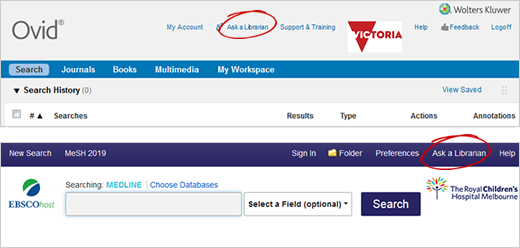
Type of review determines how you search
Here we describe the common types of reviews and how comprehensive your search must be
Literature/Integrative/Narrative/Historical review
Reviews existing literature on a broad question. Your search does not have to be comprehensive.
Scoping/Mapping review
Reviews existing literature to identify research gaps, and could lead to a systematic review. Your search must be comprehensive but will have time and scope constraints.
Rapid review
Answers a specific question usually for a policy/practice. Searching is comprehensive but has time constraints.
Umbrella review
Also known as systematic review of systematic reviews, review of reviews, synthesis of reviews, review of meta-analyses, meta-review and systematic meta-review. This type of review aims to bring together evidence from high-quality sources such as systematic reviews or meta-analyses into one overview to make it easy to compare and contrast them. Your search must be comprehensive.
Systematized review
Methodology is similar to a systematic review but not quite as stringent and is typically conducted as a postgraduate assignment. Your search may or may not be comprehensive.
Systematic review
This type of review answers a specific question. It requires a comprehensive and exhaustive search strategy, and must have a defined inclusion/exclusion criteria determined at the protocol stage.
For more information see:
- Duke University (2019). Typology of reviews
- University of Texas (2020). Systematic review resources: systematic reviews vs other types of reviews
Do not use Limit to Full Text
Most databases provide the option to limit your search results to Full Text. It is tempting to choose this limit option, but it will narrow your results to only those articles that are subscribed to by the Library, meaning your search will be incomplete.
When your search results include articles that that Library does not subscribe to, we can obtain the full text for you via our Document Delivery service.
Yale MeSH Analyzer
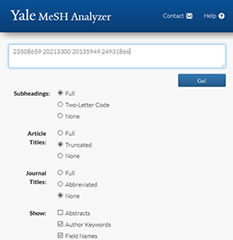
The Yale MeSH Analyzer is a handy tool which allows you to enter up to 20 PubMed ID (PMID) numbers and have it display the MeSH terms in a grid. This makes it easier to analyse the MeSH terms to see which ones to include in your search.
Typically, each column in the grid represents an article, with identifying information of the article at the top of the column, such as the PMID, the author, and the year of publication. The MeSH terms are sorted and grouped alphabetically for ease of scanning. In addition to MeSH terms, author-assigned keywords, article titles, and abstracts can be included in the analysis grid.
Read more about the Yale MeSH Analyzer.
Which database to search?
The answer to this common question is usually “it depends”. These three steps will get you started:
- Start searching in the most relevant database for your discipline; see Choose a database on the Library website.
- Check any relevant review articles you already have for a list of databases used by the authors. This is usually described in the Methods section of any given review.
- Contact the Library for help.

